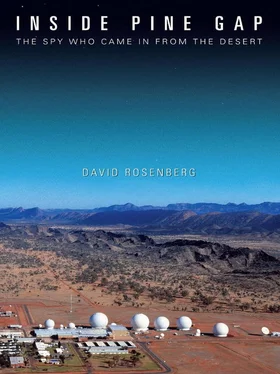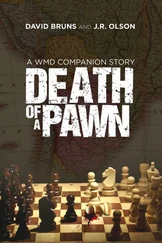So, on 5 October 2008, I left the NSA after almost twenty-three years of service. I would not receive retirement compensation from the United States Government for at least another seven years. This meant that I needed to start a new career—and soon—just to survive the very expensive living conditions in Sydney without relying on savings. Had I been employed by the CIA, I would have been eligible to retire early with full benefits at age fifty (in early 2009) as I would have met their requirement of serving at least five years overseas. Unfortunately the NSA does not share this particular benefit with their employees.
When I left the agency I did so voluntarily, bearing no negative feelings towards my former employer—in fact, I felt only positive about my time with the NSA, how my career had realised my childhood ambitions, and how my time in Australia had introduced me to the love of my life. I had made the decision to resign consciously and willingly in order to join my family in Sydney. My time with the NSA provided me with a unique career, and until the day I left I was still excited and passionate about going to work. I had been given extraordinary opportunities and experiences in Maryland and Alice Springs. I had worked with many talented Australians and Americans and was honoured to have participated in many of the intelligence community’s highest priority tasks and would recommend a career as a ‘hi-tech spy’ to any young person looking for an exciting opportunity to work for the government.
As I completed my employment with the NSA, I reflected on all I had accomplished. I never forgot that I was a civil servant, always doing the best job I could to ensure that I represented the United States effectively and with pride while serving in Australia. I was grateful to the NSA and the United States Government for working with me and allowing me to remain in Alice Springs for so long. With impending unemployment now a certainty, I completed the process of resigning from the United States Government.
On my final day at work, the deputy chief of Operations assembled the Operations team and said some very kind words about my contributions and longevity at Pine Gap. He and my supervisor then presented me with a plaque that contained a metal piece from one of the racks of equipment I had used for eighteen years. I also received a certificate of appreciation signed by the chief and deputy chief and was presented with a framed photograph of Pine Gap signed by many of my friends and colleagues.
As a long-time NSA employee, the agency also mailed me a sealed and folded flag that had once flown over the agency. I will always cherish these going-away gifts as mementoes of my experiences at such a unique place, as well as my time with the agency.
I took a final walk around Operations and said farewell to my friends and colleagues. As I turned the door handle to exit, I heard a good friend announce over the intercom system, ‘David Rosenberg has left the Operations floor’.

EPILOGUE:
BEYOND THE AGENCY
Sydney: my new home
Most career agency employees decide to wait until their retirement years to write their stories. However, I had chosen to resign voluntarily from government service while still in my forties and forfeit a career that would very likely have taken me into the higher ranks of agency leadership had I elected to return to headquarters rather than remain in Australia. Resigning from the agency early, along with my inability to find full-time work, gave me the opportunity and time to write this book. I believe I never would have considered writing about my career had I secured a full-time position soon after moving to Sydney or if I had remained employed with the NSA until retirement.
When I left the agency, I was uneasy about looking for work since I’d spent almost a quarter of a century in steady, secure employment. Job hunting was new to me and it wasn’t made any easier by the restrictions of having worked in a highly classified environment. I wasn’t allowed to include any references to the NSA, Ft Meade, Pine Gap, Alice Springs or even Central Australia in my résumé. I was only allowed to say that I had worked in Australia, so unless a prospective Defence contractor knew about the inner workings of Pine Gap and could read between the lines to establish my technical credentials, I was unable to discuss the classified details of my work in any way or show work samples of what I had done.
Leonce Kealy’s succinct summary of the precarious position of a highly trained but somewhat unemployable job seeker from Pine Gap puts into perspective the difficulty of finding post–Pine Gap employment opportunities:
After all, when you leave Pine Gap, your employment opportunities are almost non existent. This is somewhat of a dichotomy in that you have learned skills that no-one else has been exposed to, but when going for an interview, you simply cannot say what you have been doing at Pine Gap. This far from impresses the interviewer. [1] Kealy, The Pine Gap Saga , p. 19.
Kealy was referring to Australian citizens in Australia, but as I hadn’t yet become one at the time and didn’t hold an Australian security clearance, my opportunities in Defence were even more remote than these ‘almost non existent’ positions.
Résumés are subject to the same pre-publication review process required of manuscripts, and the PRB initially imposed an excessive amount of redaction from my résumé of information that was readily available in the public domain, such as the NSA’s presence at Pine Gap. I believe my résumé suffered over-classification by the PRB and that it wasn’t fully cognisant of the plethora of information about Pine Gap and NSA’s presence that is readily available, both in books and via the internet. This apparent lack of awareness, coupled with the somewhat paranoid concerns displayed by Security when I was seeking Australian residency, made my transition from an NSA employee to an eligible job seeker much more difficult than it should have been.
Former spies are at home in government, and it would have made sense to join one of Australia’s intelligence agencies in Canberra. Defence Signals Directorate (DSD), ASIO or ASIS would have been a good fit. However, since my reason for moving to New South Wales was primarily to live in Sydney, I chose to start my search for a new job with a Defence contractor in the Sydney region. Within a short time of resigning, I signed a contract after being offered a position with a major international Defence consulting firm. They hired me to work on one of their government contracts in Canberra. The compromise meant spending four days in Canberra and three days in Sydney, but they offered to cover transportation and accommodation costs, so I signed the contract and looked forward to working with this global Defence organisation. My contact inside this company told me that the economic downturn in 2008 saw them forced to retrench at least ten employees, but I was told that my skills were so rare in Australia that they were able to hire me to assist the Australian Government in its efforts to improve Australia’s signals analysis modernisation efforts, capability and associated training. As I still had seven months before I was eligible for citizenship, a citizenship waiver was required to obtain the security clearance. With assurances of support from two senior Australian government officials from Pine Gap, I believed I would receive the waiver quickly and would soon begin my new job.
I had discussed the issues involving security clearance waivers with many senior United States and Australian government colleagues, and all agreed that the cross-partnership (Australian, US, UK) security processes that are in place to transfer or grant a clearance to a non-citizen who already holds a clearance in one partner country were unnecessarily restrictive. ‘The process is broken,’ said a friend, a US citizen in the higher leadership levels of an intelligence agency, whose spouse was a US contractor but was unable to receive a waiver to work with a contractor in the UK where their partner was stationed, even though the spouse held a US security clearance. Another colleague on the executive level in the NRO believes the Director of National Intelligence (DNI) can facilitate a solution to the clearance issue, coordinating this on behalf of the intelligence community: ‘My belief is that the DNI Security Policy people need to grip this from a Community level as the large majority of these projects are of mutual interest to both countries.’
Читать дальше













